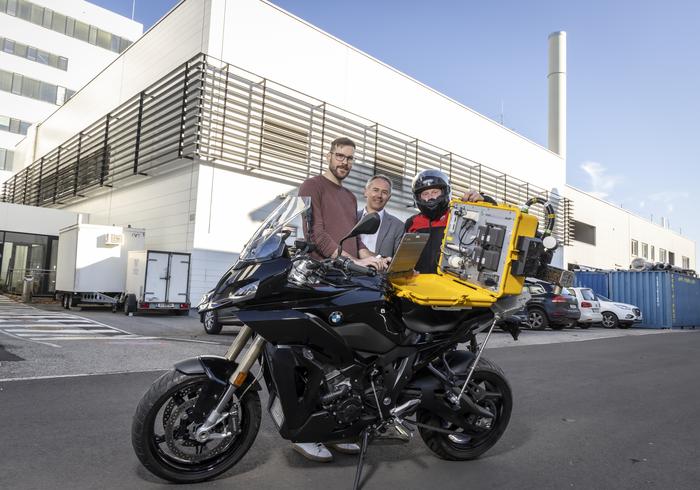
In the wake of the 2015 emissions scandal that shook the automotive industry, the conversation around realistic vehicle emissions testing has gained unprecedented urgency. This discourse is no longer confined to the highways—it’s now permeating into the realm of two-wheelers. While cars are now subject to stringent testing protocols, similar regulations have yet to extend to category-L vehicles, which include mopeds, motorcycles, tricycles, and quads. Aiming to rectify this gap, Graz University of Technology (TU Graz) has partnered with an international consortium through a groundbreaking European Commission-funded initiative known as the “LENS” project, which stands for L-vehicles Emissions and Noise mitigation Solutions. This comprehensive project targets the development of innovative testing methodologies and devices specifically designed for the assessment of emissions in two-wheeled vehicles.
The unique challenges posed by category-L vehicles have led researchers to forge new paths in measurement techniques. As Stephan Schmidt, an expert from the Institute of Thermodynamics and Sustainable Propulsion Systems at TU Graz, pointed out, conventional testing methods that work for passenger vehicles fall short when it comes to the more dynamic nature of smaller vehicles. These insights prompted a dedicated effort to create measuring devices that meet the specific demands of measuring emissions from motorcycles and mopeds. The resulting data, both in its methodology and technology, stands out on a global scale—signifying a leap forward in the scientific understanding of emissions from these classes of vehicles.
Throughout the LENS project, a collective of 15 partners—comprising nine research institutions alongside four manufacturers of two-wheelers and measurement technology—engaged in the meticulous measurement of 150 vehicles, with TU Graz accounting for 40 of these assessments. This collaboration underscores the multifaceted approach required to tackle the complexities associated with emissions testing in diverse vehicle classes. Additionally, two specific institutes at TU Graz, namely the Institute of Thermodynamics and Sustainable Propulsion Systems, and the Institute of Electrical Measurement and Sensor Systems, played a pivotal role in refining the measurement methodologies and developing tailored measurement technology for all project participants.
A primary focus of the project was the miniaturization of measurement technology. The scale and weight of measurement devices that are permissible in cars become burdensome for motorcycles and mopeds. Researchers faced the dual challenge of designing compact instruments that yield accurate readings while being lightweight enough not to alter ride dynamics significantly. This task was further complicated due to the varying horsepower across category-L vehicles; designing a unified measurement device that can efficiently function across this spectrum presents significant technical hurdles. The consortium successfully navigated these challenges, partly by leveraging external partnerships to acquire smaller measuring devices, although with varying degrees of accuracy.
Furthermore, the creation of suitable route profiles for testing involved a complex balancing act. The disparity in performance between low-powered scooters and high-performance motorcycles necessitated an approach that accommodates diverse riding styles and environmental conditions. Researchers synthesized different driving situations by integrating elements from sporty and hilly terrains, resulting in a well-rounded test environment that reflects real-world usage patterns. This attention to real-world application is crucial for ensuring that the testing methods developed align closely with everyday vehicle usage and performance factors.
One of the most intricate aspects of measuring emissions involves understanding exhaust gas mass flow, particularly in single-cylinder engines often found in motorcycles. Traditional measurement methods do not easily apply due to the smaller engine size and lower power outputs. In response to these technical challenges, the team at TU Graz developed a model-based approach that facilitated innovative mass flow calculations. By analyzing test bench data, the researchers devised a methodology to estimate mass flows during typical driving conditions, translating into actionable emission data that can effectively inform environmental regulations.
Highlighting the bounty of engine concepts within the L-vehicle sector, Schmidt elaborated on the essential need for standardized testing methods that yield realistic measurements of both noise and exhaust emissions. This undertaking is not just a technical feat; it’s a holistic endeavor aimed at establishing a foundation for accurate emissions assessments, enabling manufacturers and regulatory bodies to better understand and mitigate vehicle impact on air quality. The efforts made through the LENS project lay the groundwork for future initiatives aimed at ensuring compliance and environmental responsibility within the burgeoning segment of two-wheeled vehicles.
In conclusion, the work undertaken by TU Graz and its partners marks a significant milestone in the movement towards comprehensive emissions testing across different vehicle categories. The advancements achieved in the LENS project are set to serve as invaluable resources for legislators, manufacturers, and law enforcement agencies. As the industry moves forward, the implications of this research extend far beyond emissions data; they contribute to a larger narrative about the responsible use of technology in transportation, public health, and environmental sustainability. A paradigm shift in how we design, test, and enact regulations for two-wheeled vehicles is on the horizon—thanks in no small part to pioneering research such as this.
Subject of Research:
Article Title: RDE Methodology Development for Motorcycle Emissions Assessment
News Publication Date: 8-Nov-2024
Web References:
References:
Image Credits: Lunghammer – TU Graz
Keywords
Emissions, Measurement, Motorcycle, TU Graz, LENS project, Environmental Impact, Testing Methodology, Sustainable Propulsion Systems, Category-L Vehicles, Air Quality, Regulation Compliance, Two-Wheeled Vehicles.





